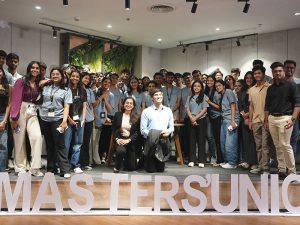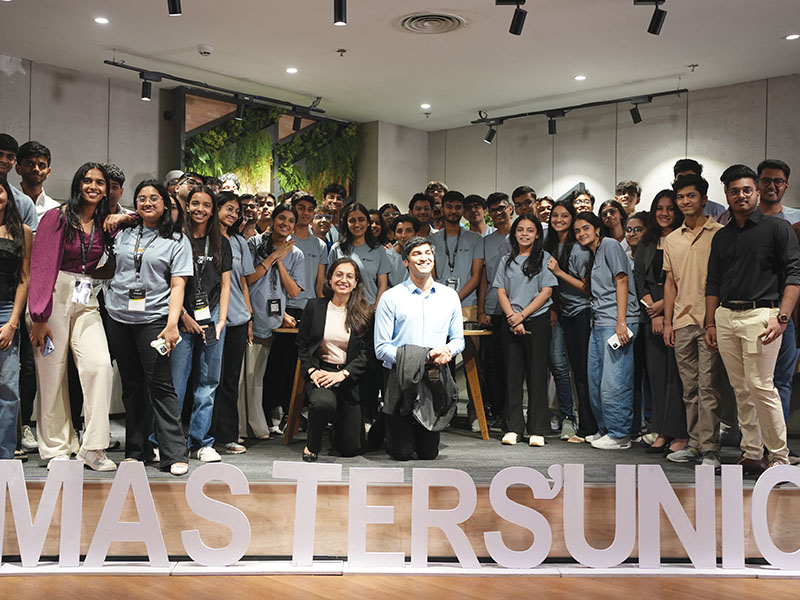21 Higher education leaders racing to develop india’s high-potential human resource: Swati Ganeti
Swati Ganeti
Director, Masters’ Union, Gurugram

An alumna of IIT-Delhi and the Wharton School of the University of Pennsylvania (USA) who began her career in Bain & Company followed by stints in several edtech start-ups, Swati Ganeti is Director, Undergraduate Programmes of the Masters’ Union School of Business, Gurugram, ranked among India’s Top 3 private B-schools in the EW India Private B-schools Rankings 2025-26.
What are the major objectives set for Masters’ Union for India’s 100th Freedom Anniversary in 2047?
At Masters’ Union, we envision becoming a beacon of education that empowers India’s youth to lead the charge in the tech revolution. By 2047, we hope to have integrated cutting-edge programs in AI, tech, and climate sustainability into our curriculum. Central to this vision is our “learn by doing” pedagogy. Under this, students work on real-world projects, co-build ventures, and collaborate with industry from day one. Through an iterative education model, we aim to maximise human potential and enable the next generation to solve real-world challenges.
How satisfied are you with your progress thus far?
I’m proud of the progress we’ve made but not satisfied. Our culture is to continuously look for new ways to innovate, improve, and push the boundaries of learning. By embracing a dynamic, evolving approach to education, we intend to unlock the full potential of our students, constantly adapting to meet the changing demands of industry and the world. Our work has just begun, and the journey is as important as the destination.
What are your major initiatives to contemporise your syllabus/curriculum?
At Masters’ Union, we don’t rely on outdated textbooks and static syllabi. Our curriculum is designed and continuously updated by industry practitioners to reflect real-time market dynamics. Over 50 percent of our curriculum is rooted in practical application — ensuring students don’t just learn theory but actually build, implement, and iterate their ideas.
We have introduced courses like Dropshipping, Content Creation Challenge to building real AI tools, consulting for local businesses, and managing a live Trading Fund so that students are immersed in hands-on learning from day one. Industry treks, on-site visits to top-ranked companies, and international immersions in corporates in Japan, Singapore, UK, US bridge the gap between classroom and boardrooms.
Also with CEOs, CMOs, and CTOs from corporates such as Google, Microsoft, Zomato, Airtel, Apple, and Kia serving as faculty, our students’ learning experience is dynamic, deeply experiential, and globally relevant.
How satisfied are you with your connect with Indian industry and business?
As an institution where CEOs and industry leaders teach directly in the classroom, our connection with Indian industry is deep and ever-expanding. That said, we’re not “satisfied” — because satisfaction implies we’ve peaked. In Masters’ Union, we believe there’s always room to grow. We’ve already built relationships with over 500 industry leaders across sectors, and we continue to expand this network to reflect the ever-changing business landscape.
So far, our students have interacted with hundreds of industry leaders across sectors — from tech and consulting to consumer brands and venture capital. Just to name a few, they’ve worked with and learned from professionals at Google, Microsoft, Zomato, Blinkit, Flipkart, Mamaearth, Chaayos, Bain, McKinsey, Cred, Meta, Kia, Kore.ai, Razorpay, and Kae Capital, among many others. These engagements happen through live projects, masterclasses, internships, placements, and on-campus sessions.
R&D and innovation are widely perceived as Indian academia’s infirmity. What’s your institutional response to create new knowledge?
I agree with this sentiment to an extent. I’ve always felt that our academic framework lags behind what the world demands. At Masters’ Union, we bridge this gap by ensuring that we are not just educating our students on what was taught yesterday, but equipping them with the tools to innovate tomorrow. We invest in real-time problem-solving, collaboration with industry, and hands-on projects to stimulate the type of research and knowledge creation that can genuinely drive change.
What’s your prescription for transforming India into a $30 trillion GDP economy by 2047?
To achieve this transformation, we need to look at education as the cornerstone of change. India’s potential lies in its talent, and we must empower that talent with the right tools and resources. We need to invest in nurturing entrepreneurial minds who will build the future, as well as integrating tech and innovation into every aspect of business and governance. Creating a robust, forward-thinking education system that teaches not just theoretical knowledge but also practical, solution-driven approaches will be key to unlocking this growth.
How optimistic are you about India’s future growth and development?
I am very optimistic, especially after seeing the talent that pours into our undergrad programme. Our students are solving real-world problems, from dementia care-solutions to sustainable fashion, AI innovations, and more. Their passion, energy, and drive to build a better future for India blow me away. With the right resources, guidance, and continuous exposure to latest technologies, they’re ready to take on the world. The potential I see in them makes me very hopeful about India’s future. And I believe with the next generation leaders, we will witness a major transformation in the global order in the years ahead.
Also Read: Masters’ Union to open 10-acre campus in Gurugram’s Cyberwalk
















Add comment